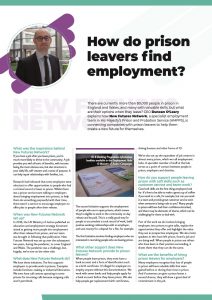How do prison leavers find employment?
There are currently more than 80,000 people in prison in England and Wales, and many with valuable skills, but what are their options when they leave? CEO Duncan O’Leary explains how New Futures Network, a specialist employment team in His Majesty’s Prison and Probation Service (HMPPS), is connecting companies with prison leavers to help them create a new future for themselves.
What was the inspiration behind New Futures Network?
If you have a job after you leave prison, you’re much more likely to thrive in the community. A job provides you with all sorts of benefits, with income being the most obvious one, but also structure in your daily life, self-esteem and a sense of purpose. It can help repair relationships with families, too. Research had indicated that some employers were reluctant to offer opportunities to people who had a criminal record or been to prison. Whilst there was a prison service team talking to employers about bringing employment into prisons, to help them do something purposeful with their time, there wasn’t a service to encourage employers to offer jobs to people after their release.
When was New Futures Network set up?
In 2018, the UK Ministry of Justice published an education and employment strategy document aimed at getting more people into employment after their release from prison, and our team was brought in following that publication. New Futures Network was set up over the subsequent two years, during the pandemic, to cover England and Wales. The pandemic was a challenge, but, happily, we’re now on the other side.
What does New Futures Network do?
We have three initiatives. The first supports employers to provide work in prisons. Examples include furniture-making or industrial fabrication. We even have call centres operating in some prisons for incoming calls because outgoing calls aren’t permitted. The second initiative supports the employment of people who are in open prisons, which means they’re eligible to work in the community on day release and be paid. This is a really good way for people to accumulate a track record of work, build positive working relationships with an employer, and save money for a deposit for a flat, for example. The third initiative involves finding employers who are interested in recruiting people who are leaving prison.
What other support does New Futures Network provide to prison leavers?
When people leave prison, they must have a bank account and a form of identification such as a birth certificate. It’s illegal for employers to employ anyone without this documentation. We work with seven banks and help people apply for a bank account before they leave prison. We also help people get replacement birth certificates, driving licenses and other forms of ID. We’ve also set up the equivalent of job centres in almost every prison, which we call employment hubs. A specialist member of staff at the hub serves as a point of contact between people in prison, employers and charities.
© Ministry of Justice Campaigns
© Ministry of Justice Campaigns
How do you support people leaving prison with soft skills such as customer service and team-work?
Good soft skills are the first thing employers look for. It’s fine to be able to make a great cup of coffee if you work in a cafe, for example, but can you work in a team and provide great customer service even when someone is being rude to you? Many people in prison will have had their confidence knocked, and there may be elements of shame, which can be challenging for them to deal with.
Part of the work we do involves bringing employers into prisons to give talks, explain the opportunities they offer and highlight the value they see in prospective employees. We also invite speakers in who have left prison, found a job and are doing well. When people in prison see others who have been in their position succeeding, it shows them that they can do the same.
What are the benefits of hiring prison leavers for employers?
Many employers recognise that lots of people in prison will have valuable skills that were gained before or during their time in prison. And if someone can give a prison leaver a second chance, they will show a great commitment in the job.
Employers may also be socially motivated, in that it not only works for their business, but they also want to demonstrate to their customers that they’re contributing to society, as well.
Which sectors are the biggest employers of prison leavers?
The construction and hospitality sectors are typically the two biggest employers, but the logistics sector is also growing. For example, a driving job works well for people on day release. Other sectors include retail and the civil service.
Who are some of the pioneering organisations?
The Timpson Group, a British and Irish service retailer, has recruited hundreds of prison leavers over the years, and its chief executive James Timpson is a well-known advocate for this. Other organisations that have been doing this for a long time include Greggs (a bakery chain), Cook (a frozen food retailer), Iceland (a supermarket chain), Halfords (a motoring and cycling retailer),
DHL (a logistics and courier company), and Kier (a construction services company). Greene King, the pub retailer and brewer, is new to this but doing fantastically well.
Are there similar programmes in other countries?
I haven’t come across anything similar. We’ve had various prison services from around the would show interest. For example, a member of my team was invited to present in Canada, so I think we’re achieving something that not many others are doing.
What are the programme’s successes to date?
The proportion of people who were in prison and are now in employment has gone up quite dramatically. Just over two years ago, around 14% of people were employed six months after their release. We’re now up to around 30%. It’s important to say that this is not all down to us; staff in prisons, charities and other organisations in the sector are all part of this work, too.
What’s your vision for New Futures Network?
With low unemployment levels, companies are becoming more creative about where to look for new employees. There are an increasing number of companies offering opportunities to people leaving prison and many of these companies are at the start their journey.
I’d like to see this becoming a normal part of companies’ recruitment drive so that employing people who have left prison is no longer unique or unusual. Even if unemployment rates change, I’d like to see organisations continue doing this because it has worked well for them and it’s something their company values. That’s the real goal.
Meet Duncan

I studied history at university, which has provided me with lots of skills that I’ve ended up using as a civil servant. When you’re a civil servant, you report to ministers who then report to Parliament. We write a lot of briefings that either explain what we’re doing or advise ministers on key matters. My background in history helps me bring lots of different information together, set it out in a logical format and write it in a clear way.
I’ve had various jobs in public policy since leaving university. I’ve worked for a political think tank, a member of Parliament, and for the Government’s Home Office, as well. I was part of the policy team that worked on the 2018 education and employment strategy for people leaving prison. I then followed it into the prison and probation service and, ever since, I’ve been heading the New Futures Network team.
It’s perhaps the most satisfying job I’ve done so far because it’s very closely connected to people’s lives. I was always interested in politics growing up. I wanted to do a job where I could make a difference, and working in policy and operations is one way of doing that.
I’d advise people to experience as many different things as they can. Try to involve yourself in different types of workplaces and sectors but also think about your interests. You’ll have a far more successful career if you can put your whole self into your work, rather than counting the hours until you go home each day.
The best advice someone gave me is that, when you’re in a job, there will be things that you’re more interested in doing than others, and it’s within your control to move closer to what interests you. For example, you can talk to your employer and work on things that are outside your job description. My jobs have always evolved and often towards things I’m really interested in.
Another piece of advice is not to undersell yourself too much! As a manager, I’ve noticed that men are often more confident about putting themselves forward for roles than women. Somebody once said to me that every promotion is slightly outside your comfort zone because you won’t have done the job yet. I’ve noticed that some women want to reassure themselves that they can do the job and so wait a few years when, realistically, they were always just as capable as the men who applied straight away. So don’t be afraid to put yourself forward for something you haven’t done before – that’s why it’s a promotion!




That’s a great help not only for the prisoners but for the community. I hope many companies help them to start a new life.